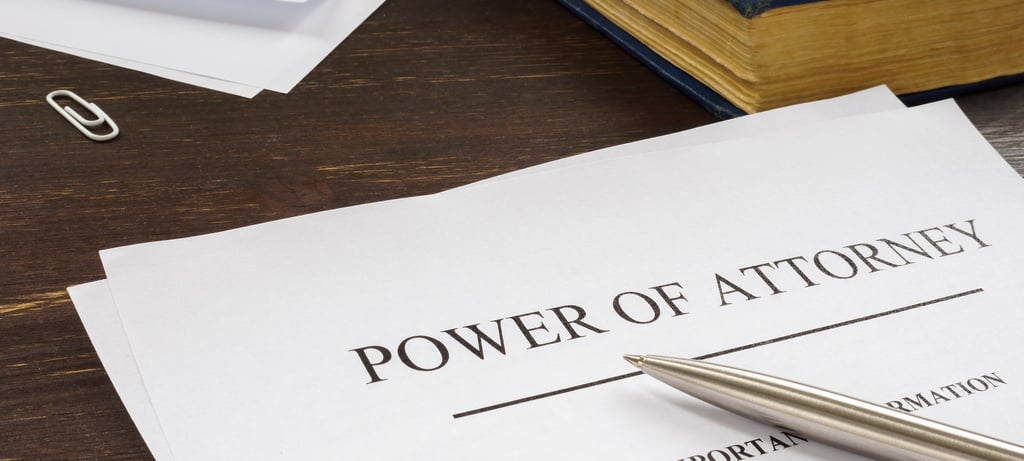Power of Attorney: The Most Important Document You’re Probably Ignoring
If you lose the ability to make decisions, who steps in? If you don't have this in place, the answer might not be who you expect.
Alex Johnson
5/10/20253 min read


Power of Attorney: The Most Important Document You're Probably Ignoring
If you lose the ability to make decisions, who steps in? If you don't have this in place, the answer might not be who you expect.
The Document Everyone Overlooks
We're brilliant at avoiding thoughts about our own mental decline, aren't we? We'll happily draft a will (eventually) because, well, we know we're going to die someday. But temporary or permanent loss of mental capacity? That's somehow both more frightening and easier to pretend won't happen to us.
Let me be blunt: ignoring the possibility doesn't make it less likely. Accidents, sudden illness, or conditions like dementia can affect anyone. And if you haven't sorted a Lasting Power of Attorney (LPA), you're essentially leaving your life, healthcare, and finances to chance – or worse, to the courts.
The Uncomfortable Truth
Here's what most people don't realize until it's too late: your spouse, partner, or children have absolutely no automatic right to make decisions for you if you lose capacity. None. Zip. Nada.
"But surely my wife can access our joint account if I'm in a coma?" Afraid not. The moment your other half can't make decisions (loses mental capacity), banks often freeze the entire account faster than you can say "but it's our money." Yes, even if your name's on it too. They might allow essential payments after considerable fuss and paperwork, but your easy access vanishes overnight. Fancy explaining your weekly Tesco shop to a banking official? Didn't think so.
"My son can surely speak to doctors about my care if I have dementia?" Not without the proper authority. Family ties count for precisely nothing without legal authority. Doctors won't - in fact, can't - discuss your treatment, medication, or care plans with your children – regardless of how concerned or helpful they are. The NHS follows strict rules, not family trees. No Lasting Power of Attorney for Health and Welfare means no say whatsoever.
Without an LPA, your loved ones will need to apply to the Court of Protection to become your deputy – a process that's expensive (think thousands of pounds, not hundreds), painfully slow (often taking months), and incredibly stressful during what's already a difficult time.
Two Types, Twice the Protection
There are two types of LPA, and ideally, you should have both:
Health and Welfare LPA – Gives your chosen person(s) authority to make decisions about your medical treatment, care, daily routine, and even life-sustaining treatment.
Property and Financial Affairs LPA – Allows your attorney to manage your money, pay bills, deal with your property, and handle your investments.
Without these, banks may freeze accounts (even joint ones), care decisions could be made by strangers, and your wishes might go completely unheeded.
The "It Won't Happen to Me" Fallacy
I get it. Nobody wants to imagine themselves unable to make decisions. But consider the facts:
One in 14 people over 65 has dementia
Every 90 seconds, someone is admitted to hospital with a brain injury
Severe illness can affect anyone at any age
This isn't about being morbid; it's about being realistic. And responsible.
The Ultimate Act of Love
Setting up an LPA isn't just sensible planning – it's an act of deep consideration for your loved ones. It prevents them from having to fight bureaucratic battles while they're worried sick about you. It ensures your wishes are followed. And it gives everyone peace of mind.
The process isn't particularly complicated or expensive (especially compared to the alternative), but it does need to be done properly and registered with the Office of the Public Guardian to be valid.
Don't Put It Off
If you're thinking, "Yes, I really should sort that out someday," let me ask you this: what are you waiting for? A warning sign? By the time that comes, it's often too late. You can't give others the legal right to administer your affairs once you've lost the capacity to give that permission.
Setting up an LPA is one of those tasks that's easy to postpone indefinitely – until suddenly it's impossible. Don't leave your loved ones in that position.
Get it sorted. Today. This isn't about paperwork – it's about protection when you're at your most vulnerable.
Click here to access the section on how to set up the Healthcare Power of Attorney.
Click here to access the section on how to set up the Financial Power of Attorney.
